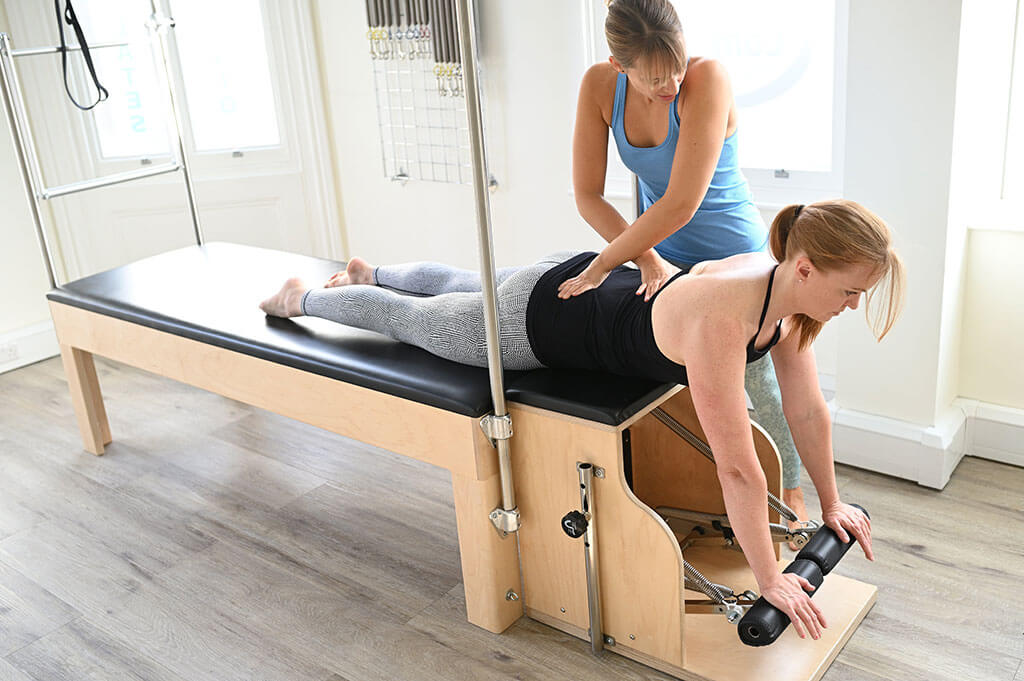Many studies prove that exercising on a regular basis helps build strength, improves mood, controls weight and helps prevent health conditions and diseases but can it really combat cancer?
In this article we’ll explore how exercise and cancer can be a positive combination to improve your lifestyle and outlook on life.
Pilates for cancer patients – can I exercise if I am receiving treatment for cancer?
YES! Pilates for cancer patients is extremely beneficial.
Throughout treatment a patient’s immune system is often compromised.
Cancer treatments can cause fatigue, sickness, and appetite loss. None of which help with a “get up and go” frame of mind. However, if you can motivate yourself to exercise at your own pace, you will feel more positive. Each day will become easier as your immune system builds along with your strength and mobility.
Most people are aware that Pilates is a low-impact form of exercise that helps build muscle strength. It can also be beneficial for people with cancer. Taking on exercise like Pilates, can help reduce stress and tiredness, improve mood and potentially increase the quality of day to day life for people going through cancer treatment.
The more active you are the greater the benefits, but you must consult your doctor before taking on anything considered “strenuous”.
What exercises can I NOT do if I have cancer?
There are no limits to what you can do to exercise while fighting cancer.
This is because there are more than 100 different types of cancer, all of which affect people differently. There is no ‘one size fits all’ when it comes to exercising before, during or after cancer. So each case is specific to the individual and the treatment.
For example, you will want to avoid cycling if you have been diagnosed with colon cancer, you may also feel uncomfortable wearing a swimsuit if you have undergone a mastectomy. It all depends on what you feel most comfortable doing, but it is possible to build up your exercise pattern as you progress.
We do recommend avoiding high impact sports and weight lifting if you’re currently having treatment for cancer.
Will exercise help me fight my cancer?
Exercise has been proven to actually help to destroy tumour cells.
Being regularly physically active will help your treatment to be more effective and help you to fight cancer.
Not only will it help to destroy tumour cells but it gives you a positive frame of mind and helps you to recover more quickly from treatment. Remaining active can also boost your immunity, not just helping you fight the cancer but also reducing your risk of recurrence.

What are the benefits to preventing cancer from returning?
Many who have already defeated cancer return with a healthy ambition to exercise more due to the massive benefits of fending off a returning diagnosis.
In recent studies gathered by Macmillan, it found that people who took regular exercise had an average of a –
40% lower risk of breast cancer returning
50% lower risk of colon cancer returning or dying of colorectal cancer
30% lower risk of men dying from prostate cancer
These studies also showed improvements in physical function and psychological well being.
Can exercise prevent cancer?
YES – Regular exercise plays a key role in preventing cancer by helping lower blood estrogen, reduce sex hormones and insulin levels, all of which can play a part in rapid cell growth or gene mutation. Exercising has many other benefits such as releasing endorphins and serotonin to help improve your mood. This in turn encourages you to be more active and improve your quality of life.
Other ways to help prevent cancer are –
- A healthy diet including plenty of fibrous whole grains
- Avoiding nicotine
- Limiting alcohol intake
- Protecting yourself from the sun
- Regular medical checkups
We recommend at least 30 minutes of aerobic, dynamic or flexibility exercises per day in line with Department of Health guidelines of 150 minutes per week, up to five days a week to help maintain a healthy lifestyle.

Good to know
Cancer patients may have a vulnerable immune system depending on the treatment given. In this period of time you are more susceptible to contracting illnesses which can negatively affect your treatment. To minimise the risk of picking up an illness, consult your doctor before taking up exercises in public areas, especially in confined spaces, such as gyms and swimming centres.
Chemotherapy patients may experience cycles of sickness and fatigue depending on the treatment. It is always recommended to keep a diary to help identify the patterns and adjust the intensity of your exercises accordingly.
Avoid high risk contact sports due to potential negative effects on your bone density during treatment.
Related reading: Can you exercise while having chemotherapy
Is there a right time to start an exercising program?
It is common when you have just been diagnosed or just starting treatment to stop exercising or reduce activity levels. However, it is actually beneficial to keep exercising at all stages of treatment as long as complications do not contraindicate it. Your cancer rehabilitation physiotherapist can help to advise you on how and when to exercise.
As long as the programme is taking into account your diagnosis, treatment and how you are feeling then you should be able to start exercising straight away. It is important to listen to your body but even on days when you are feeling fatigued it can help to be active.
When you start you can speak to your doctor and a cancer rehab physio to help to get the right advice for you and your body.
For further information or if you have questions about developing a personal Pilates exercise plan whilst undergoing Cancer treatment please contact us. We will discuss your options with you and determine how we can help you best.
Learn more about our:
– Complete Pilates Islington
– Complete Pilates Kensington
– London City Pilates Studio
At Complete Pilates we would advise you to always speak to your doctor, physiotherapist, or clinical Pilates instructor here at Complete Pilates if you are worried about starting a new exercise regime.
Get in touch online or contact us on 0203 764 5668 for further information and / or advice!
Education is key:
These blogs are designed to give information to everyone, however, it is important to remember that everyone is different! If you have not seen one of our therapists and have any questions about injuries, what you have read or whether this may be useful to you, please just ask. We are more than happy to help anyone and point you in the right direction. Our biggest belief is that education is key. The more you understand about your injury, illness and movement, the more you are likely to improve.




